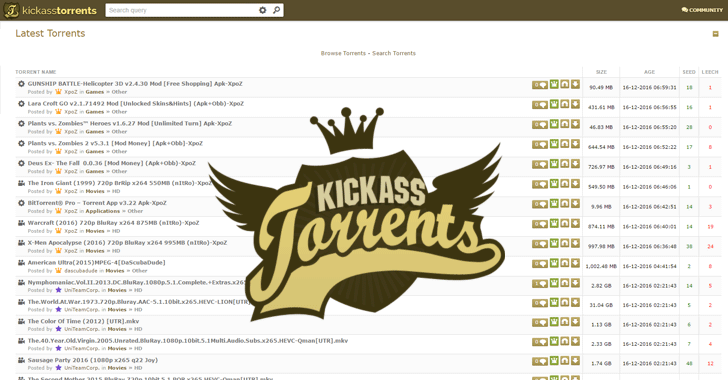In the ever-evolving landscape of the internet, few websites have garnered as much notoriety as KickassTorrents (KAT). For more than a decade, KAT served as a hub for file-sharing and torrent downloads, becoming one of the most popular destinations for users seeking to download movies, music, software, and other digital content. This article explores the rise and fall of KickassTorrents, shedding light on its impact on online piracy and the consequences it faced.
The Birth of KickassTorrents
KickassTorrents was founded in 2008 by a user known as Artem Vaulin, a Ukrainian national. The website was designed as a platform to facilitate the sharing of torrent files among users. In its early days, KAT featured a relatively simple interface and was relatively obscure. However, it didn’t take long for the site to grow in popularity and become a formidable player in the world of torrenting.
The Growth and Popularity
One of the reasons for KickassTorrents’ rapid growth was its user-friendly interface and the absence of intrusive ads and pop-ups, a stark contrast to many other torrent sites. Users appreciated the clean design, easy navigation, and the vast library of torrents available for download. The site quickly rose through the ranks, earning a reputation as one of the go-to destinations for obtaining torrents of various digital content.
Another significant factor in KAT’s popularity was its active community. Users could leave comments and feedback on torrents, helping others make informed decisions about what to download. This sense of community fostered a loyal following that continued to fuel the site’s growth.
Legality and Controversy
As with many torrent websites, KickassTorrents found itself in the crosshairs of the legal system and copyright holders. Critics argued that KAT enabled and profited from copyright infringement, causing significant financial losses to the entertainment industry. Legal authorities and copyright organizations took various actions to combat the website, including issuing takedown notices and pursuing lawsuits.
The website’s operators, however, were quick to distance themselves from the actual distribution of copyrighted material. They claimed that they merely provided a platform for users to share and access torrents and did not host the infringing content themselves. This legal gray area allowed KAT to continue operating, albeit under increasing scrutiny.
The Downfall
The beginning of the end for KickassTorrents came in 2016 when the U.S. Department of Justice charged Artem Vaulin, the alleged owner of KAT, with a slew of copyright infringement-related offenses. Vaulin was arrested in Poland, and the website’s domain was seized by the U.S. government. This high-profile arrest sent shockwaves through the torrenting community and signaled the downfall of one of the most popular torrent websites in history.
Following Vaulin’s arrest and the seizure of the KAT domain, several mirror sites and clones emerged, attempting to fill the void left by the original KickassTorrents. These efforts, however, were plagued with legal issues, instability, and a lack of trust among users. As a result, none of these successors managed to capture the same level of popularity and trust that the original KAT had enjoyed.
Legacy and Lessons
KickassTorrents left behind a lasting legacy that continues to shape the world of online piracy and file sharing. Its rise and fall highlighted the ongoing struggle between copyright holders and those who seek to share and access digital content without paying for it. The case also demonstrated the extent to which law enforcement and international cooperation can have a substantial impact on even the most prominent players in the piracy world.
One lesson that can be drawn from the story of KickassTorrents is that the pursuit of piracy-related charges is not limited to those who directly host or distribute copyrighted material. Individuals who create and operate platforms facilitating the sharing of torrents can also face legal consequences. This has led to a more cautious approach among many torrent website operators, with some shutting down or switching to less legally vulnerable technologies like blockchain.
Moreover, the downfall of KickassTorrents showed the importance of cybersecurity for those involved in the piracy ecosystem. Artem Vaulin’s arrest was the result of a series of mistakes and lapses in operational security, which ultimately led to the demise of the website. This underscores the need for individuals and organizations involved in torrenting to take measures to protect their identities and operational activities.
The Impact on Online Piracy
The demise of KickassTorrents left a noticeable void in the world of online piracy. While other torrent websites and sharing platforms still exist, none have managed to replicate the same combination of user-friendliness, community engagement, and extensive library that KAT provided. As a result, some users shifted to alternative methods of obtaining content, such as streaming services and legitimate downloads, while others continue to seek out alternative torrent websites.
Additionally, the takedown of KAT sent a clear message to other torrent operators and websites involved in piracy that legal consequences are possible. This has contributed to a more cautious and decentralized landscape for online piracy, with many smaller, less well-known sites popping up and offering similar services.
Conclusion
KickassTorrents, once a titan of the torrenting world, fell from grace due to a combination of legal actions, the arrest of its alleged operator, and operational security failures. Its rise and fall serve as a testament to the ongoing struggle between copyright holders and those who seek to access and share digital content without paying for it. While the world of online piracy continues to evolve, the story of KickassTorrents remains a significant chapter in this ongoing saga, underscoring the enduring challenges and complexities of digital copyright enforcement.




